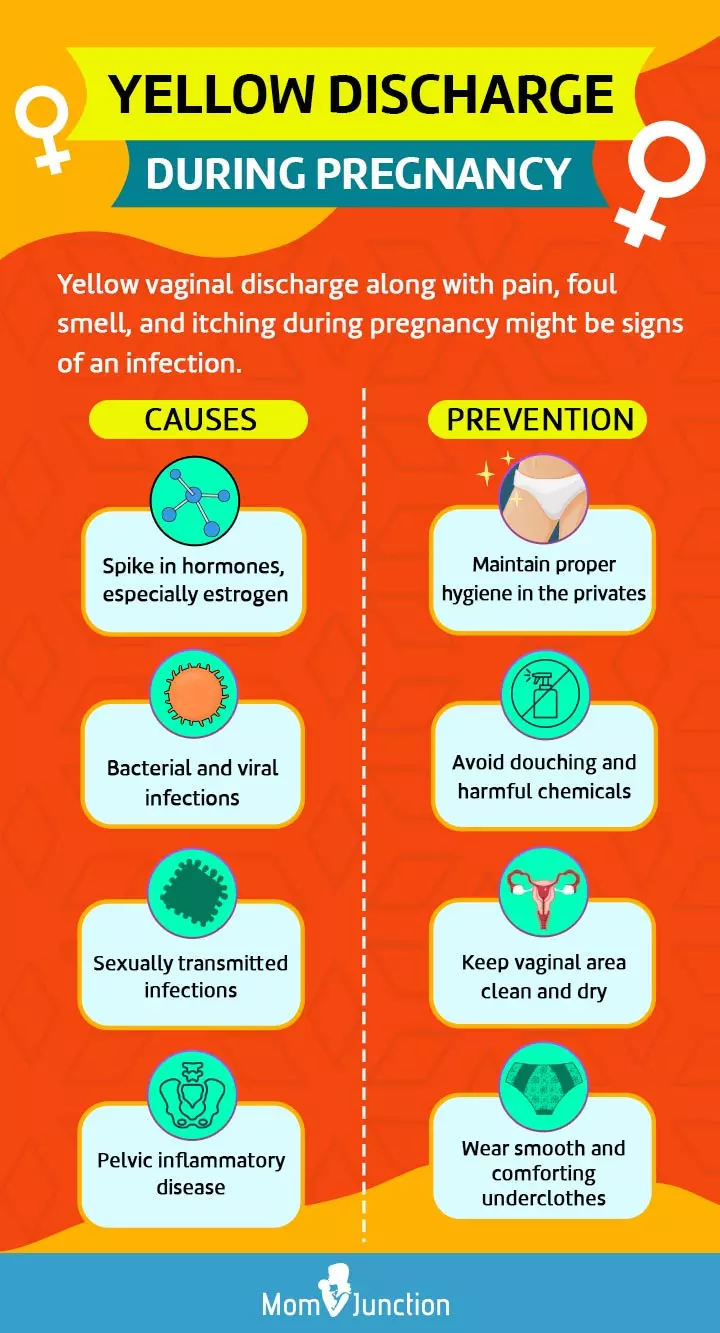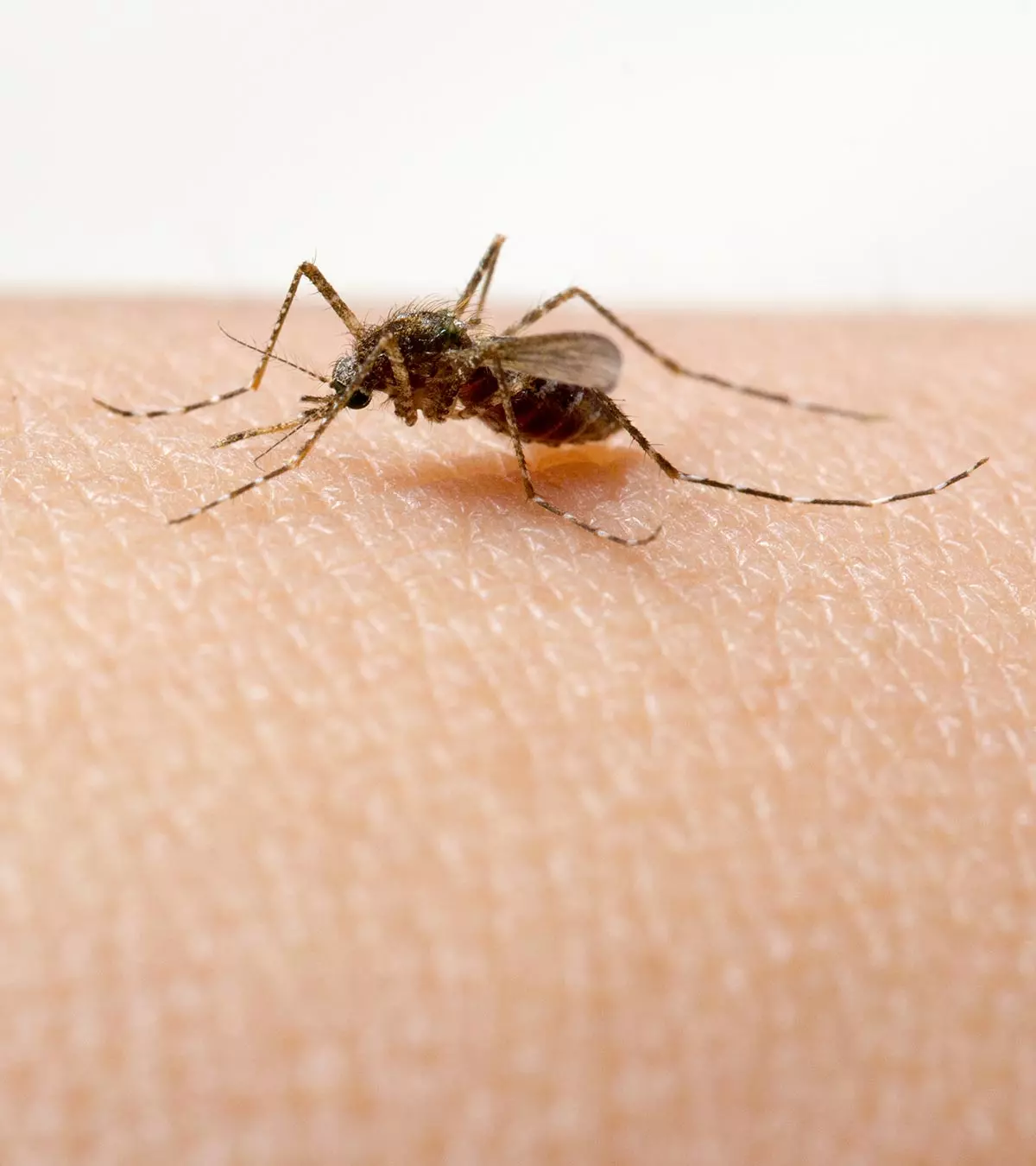
Image: Shutterstock
Many women experience vaginal discharge during pregnancy due to various reasons. Hormonal changes may cause a slight yellow discharge without other symptoms, but a peculiar smell or other symptoms that accompany yellow discharge during pregnancy may indicate amniotic fluidiThe clear fluid that surrounds the baby in the uterus. leak or infections. Therefore, it is important you monitor changes in vaginal discharge during pregnancy and get timely intervention. Seek advice from a doctor to know the exact cause, especially if you are uncertain about the accompanying symptoms.
Read on to know the causes, treatment, and prevention of yellow discharge during pregnancy.
Key Pointers
- Yellow discharge with a characteristic odor in pregnancy might primarily indicate infections.
- Ensure adequate personal hygiene and avoid douching to reduce the chances of developing the condition.
- Talk to your obstetrician if you are concerned about yellow discharge in pregnancy to comprehend the reasons and get timely medical care.
Is Yellow Discharge In Pregnancy Normal?

You may be wondering what does yellow discharge mean during pregnancy? During pregnancy, it is normal to have thin, milky white, slightly yellow, and mildly odorous discharge, which is also known as leucorrhea. This might increase as the pregnancy progresses, and is usually due to the fluctuating hormones (1). Also, sometimes, women might notice clear, pale yellow watery discharge during pregnancy with a mild or a sweet smell, which could be leakage of amniotic fluid (2), a possible indication of labor.
But, if you have noticed yellow discharge in early pregnancy accompanied by itchiness, foul odor, soreness, and pain when urinating, then it might indicate an infection. While such symptoms do not necessarily mean a health problem or an infection, it is good to know the reason behind such discharge and address it if necessary.
What Causes Yellow Discharge During Pregnancy?
Dr. Ila Dayananda, board-certified obstetrician/gynecologist from Brooklyn, New York, says, “Estrogen plays a central role in the menstrual cycle and reproductive health. Changes in estrogen levels can influence vaginal discharge, but estrogen itself is not a direct cause of yellow discharge. Various factors, including the balance of microorganisms in the vagina, can contribute to the color and texture of the discharge.”
The other possible causes of discharge, especially yellow discharge, are as follows:
- Yeast infections: The vagina requires optimal conditions of pH, moisture levels, and bacterial balance to remain healthy. If one of these conditions is disturbed, it could raise the risk of infection. Factors such as increased sexual activity, antibiotics, hormonal imbalances, and douchingiThe act of cleaning the vagina internally using water or a mixture of other liquids. could cause an overgrowth of bad bacteria.
Candidiasis is a common yeast infection that causes yellow-white discharge along with itchiness, swelling, soreness, redness, and burning sensation during urination (3).
 Quick fact
Quick fact- Bacterial vaginosis (BV): It is caused due to a bacterial imbalance. Usually, good bacteria control bad bacteria in the vagina, but when it gets reversed, it might cause BV. It, therefore, results in a yellow or green discharge that is thick and foul-smelling and is associated with vaginal pain and burning sensation (4).

- Sexually transmitted infections (STIs): They are the common causes of abnormal vaginal discharge and pose a risk of other STIs if not treated on time. The major types of STIs include trichomoniasisiAn infection caused by the Trichomonas vaginalis parasite that causes itching, burning, redness, and swelling (5), Chlamydia, and gonorrhea (6). According to surveillance reports by the Centers For Disease Control and Prevention (CDC) about 2.5 million cases of chlamydiaiAn infection caused by the bacterium Chlamydia trachomatis , syphilisiA bacterial infection caused by Treponema pallidum characterized by flu-like symptoms and sores , and gonorrheaiA bacterial infection caused by Neisseria gonorrhoeae characterized by pain, fever, and inflammation , were reported in the US during 2021 (15).
- Pelvic inflammatory disease (PID): When STIs or bacterial infections are left untreated, the infections spread to the uterus, ovaries, and fallopian tubesiMuscular, hollow ducts connecting the uterus with the ovaries to transport eggs during ovulation. . As a result, they lead to symptoms such as yellow discharge, pain during pelvic exams, nausea, fatigue, and painful urination (7).
These are the likely reasons for yellowish discharge during pregnancy. Sometimes, you might have the discharge not because of any infection, but because of wearing uncomfortable panties or using unhygienic products too.
But if the discharge is abnormal and you have symptoms such as itchiness, foul odor, and vaginal pain, you should see a doctor. Medical tests help diagnose the condition, and the doctor would suggest the necessary treatment.
While there are many different types of vaginal infections, the graph below indicates the incidence of three common ones among pregnant women, including vulvovaginal candidiasis (VVC), bacterial vaginosis (BV), and trichomoniasis (TV). As shown in the graph, the prevalence of VVC, BV, and TV among 589 pregnant women was 36.5% (215/589), 30.9% (182/589), and 1.4% (8/589), respectively. Also, the data shows that more than half of the pregnant women had at least one of the three vaginal infections.

Incidence of vaginal infections in pregnant women
Source: Prevalence of vulvovaginal candidiasis, bacterial vaginosis and trichomoniasis in pregnant women attending antenatal clinic in the middle belt of Ghana; BMC Pregnancy and ChildbirthHow Is Yellow Discharge Treated?

Yeast infections are treated with antifungal tablets, creams, ointments, or suppositories. Bacterial and sexually transmitted infections are treated with antibiotics that are considered safe during pregnancy (8).
The duration of the treatment depends on the severity of symptoms. The sooner you receive the treatment, the lesser the possibility of infections that cause complications, such as pelvic inflammatory disease (PID).
Even as you follow the course of treatment, it is good to take proper pregnancy care at home to deal with the infection as well as prevent it in the future. You may consider complementary treatments, such as dietary adjustments and probioticsiA Lactobacillus species that promote a balance in vaginal microbiome and maintain an acidic environment to prevent infections , in addition to the prescribed medications for vaginal health. However, make sure to consult your doctor before taking any supplement, new food, or probiotics.
 Research finds
Research findsHow To Prevent Yellow Vaginal Discharge?
The following measures help in reducing the discomfort associated with abnormal discharge and also prevent it, promoting good reproductive health (9).
- Wear panty liners to absorb the discharge and remain dry.

- Keep the vaginal area healthy by wiping it from front to back after urination and bowel movements.
- Wash your genitals with mild soap and dry them.
- Avoid hot bathtubs and douching as it can change the normal bacterial levels and aggravate yeast infections.
- Avoid scented soaps and toilet paper, hygiene sprays, and tight-fitting panties.
- Wear cotton and clean panties for extra comfort.
- Do not use chemicals for washing the area.
- If the vagina is itchy, control the urge to scratch as it could make the condition worse.
- Stay away from stress by practicing yoga and meditation.
Basic hygiene, plenty of sleep, a healthy diet, and drinking water frequently are good not just for vaginal health but also for your overall health.
Frequently Asked Questions
1. Does yellow discharge mean miscarriage?
Yes. Yellow discharge could be a sign of bacterial vaginosis, which can increase the risk of miscarriage by twofold if left untreated in the first trimester (10). Therefore, it is crucial to prioritize pregnancy health and seek medical attention if experiencing any concerning symptoms.
2. When should I be worried about discharge during pregnancy?
If you notice vaginal discharge during pregnancy green or yellow, has a different consistency and smell, or your vaginal area is itchy or red, you should contact your obstetrician (11).
3. Will the yellow discharge go away on its own when pregnant?
No. If yellow discharge during pregnancy is caused by increased hormonal levels and without any accompanying symptoms, it may present throughout the pregnancy and not be a cause for concern (1) (14). However, it is important to continue receiving regular prenatal care and to inform your healthcare provider of any unusual changes in discharge or other pregnancy concerns.
4. How can yellow discharge during pregnancy affect mental health?
Yellow discharge during pregnancy can make you anxious and worried about your baby’s safety and adding to your pregnancy blues. Therefore, it is important you communicate with your healthcare provider to resolve every doubt and concern.
Yellow discharge during pregnancy is a common occurrence. However, if it is accompanied by a foul odor, itchiness, or discomfort, you should contact your doctor immediately. If required, yellow discharge may be treated with antifungal tablets, creams, etc., depending on the cause. Keeping your vaginal area clean and healthy, not exposing them to chemicals, wearing panty liners to help absorb the discharge, and keeping the area dry are recommended to prevent infections or complications. However, if you suspect an infection or any other pregnancy complications, consult your gynecologist.
Infographic: Synopsis Of Yellow Discharge During Pregnancy
The fluctuation of hormones can trigger yellow discharge during pregnancy. However, if the discharge is accompanied by itchiness and odor, it could be a sign of infection. Check out the infographic below to know:
- The reasons for the condition
- Ways to prevent it

Illustration: Momjunction Design Team
References
1. Somia Gul, et al.; Women facing heavy vaginal discharge (leucorrhea) by virtue of unhealthy lifestyle; Academia.edu
2. Signs of labor; American Pregnancy Association
3. L Renee Watson et al.; Yeast infection; University of Rochester Medical Center
4. Vaginal Discharge; Family Doctor.org (2014)
5. About Trichomoniasis; Centers for Disease Control and Prevention (2017)
6. Chlamydia, gonorrhea, and syphilis; The American College of Obstetricians and Gynecologists (2016)
7. Vaginal infections & PID; Sutter Health Palo Alto Medical Foundation
8. Sexually transmitted infections, pregnancy, and breastfeeding; Office on Women’s Health; U.S. Department of Health and Human Services (2019)
9. Genital and reproductive health; Princeton University
10. Gözde Işik et al.; Bacterial vaginosis in association with spontaneous abortion and recurrent pregnancy losses; Journal of Cytology (2016)
11. Vaginal Discharge During Pregnancy; American Pregnancy Association
12. Yeast Infections During Pregnancy; American Pregnancy Association
13. A Metin Gülmezoglu et al.; Interventions for trichomoniasis in pregnancy; Cochrane Library (2011)
14. Discharge During Pregnancy: What’s Normal?; Lamaze International
15. Sexually Transmitted Disease Surveillance 2021; Centers for Disease Control and Prevention
Community Experiences
Join the conversation and become a part of our nurturing community! Share your stories, experiences, and insights to connect with fellow parents.
Read full bio of Dr. Christian Pope
- Dr. Ila Dayananda, a board-certified obstetrician & gynecologist, most recently served as the chief medical officer for Planned Parenthood of Greater New York. She studied medicine and master's in Public Health at Northwestern University Medical School and then pursued an OB/GYN residency at the Beth Israel Deaconess Medical Center in Boston, MA. Dr. Dayananda holds a Family Planning Fellowship at Brigham and Women's Hospital/Harvard Medical School in Boston, MA.
 Dr. Ila Dayananda, a board-certified obstetrician & gynecologist, most recently served as the chief medical officer for Planned Parenthood of Greater New York. She studied medicine and master's in Public Health at Northwestern University Medical School and then pursued an OB/GYN residency at the Beth Israel Deaconess Medical Center in Boston, MA. Dr. Dayananda holds a Family Planning Fellowship at Brigham and Women's Hospital/Harvard Medical School in Boston, MA.
Dr. Ila Dayananda, a board-certified obstetrician & gynecologist, most recently served as the chief medical officer for Planned Parenthood of Greater New York. She studied medicine and master's in Public Health at Northwestern University Medical School and then pursued an OB/GYN residency at the Beth Israel Deaconess Medical Center in Boston, MA. Dr. Dayananda holds a Family Planning Fellowship at Brigham and Women's Hospital/Harvard Medical School in Boston, MA.
Read full bio of Rebecca Malachi
Read full bio of Dr. Ritika Shah
Read full bio of Reshmi Das



















